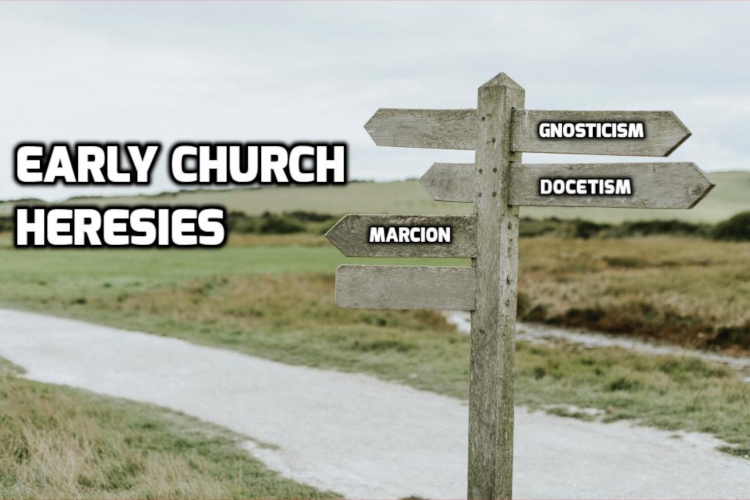While not a complete list of early church heresies, these groups are the ones that the New Testament authors seem to write against and respond to most often.
Below is a simplified, summary of their beliefs compiled from The Zondervan Encyclopedia of the Bible, The Letters of John by John R.W. Stott, The Early Church by Henry Chadwick, and New Testament History by F.F. Bruce and some online resources.
Gnosticism
Gnosticism is a term applied to many different late 1st Century & 2nd Century groups who called themselves Christian but deviated from apostolic Christianity. Gnostics began around 80 AD and flourished into the second century. All the forms of Gnosticism were dominated by a concern for knowledge.
Authority: Gnostics paid lip-service to the same authority as mainstream Christianity: Jesus & the apostles. But they claimed only they had secret, reliable knowledge which was conveyed by the apostles from Jesus but that other Christians lacked.
Salvation: Gnostics thought evil was a matter of ignorance and distortion. They thought salvation was not a matter of forgiveness, but rather a matter of overcoming defilement through knowledge and enlightenment.
Sin: Gnostics believed that the spirit was good and the physical was evil. They sought to release the spirit from the evil body through knowledge. The “elect” contained a “divine spark” within them that allowed this release. This idea led to 3 views:
- Sin does not influence our behavior. We can control sin through asceticism (fasting, celibacy, abstinence, etc.) and rigid control over our bodies or even physical abuse.
- Sin does not exist in our spirit. Sin is only in our physical bodies. Once we have the right knowledge, it doesn’t matter what we do with our bodies. Therefore, all forms of sexual immorality, and self-indulgence are permissible.
- Sin does not affect our relationship with God. Since only the body is evil and God would never stoop so low as to have anything to do with anything material, sin in our body is irrelevant to our relationship with God.
Incarnation: Gnostics believed Jesus was not really a man. Because the body was evil, God could not inhabit something evil and He certainly could not suffer pain or die.
Other Believers: Gnostics believed they possessed “superior knowledge” and a “divine spark” which other Christians lacked. Thus, as the self-proclaimed “spiritual aristocracy,” they despised other Christians.
- Gnosticism – Holman Bible Dictionary
- Gnosticism – Hastings’ Dictionary of the Bible
- Gnosticism – Cyclopedia of Biblical, Theological and Ecclesiastical Literature
- Gnosticism – International Standard Bible Encyclopedia
- GotQuestions.org: What is Christian gnosticism?
- Heresies of the Church Thru the Ages: Gnosticism
Docetism
- The word Docetism comes from the Greek word “dokein” which means “to seem”.
- Docetism claimed that Jesus was not both man and God. He only seemed to be.
- One form held that the incarnation only “seemed” real and that Jesus had no physical human body at all.
- Another form held that Jesus only “seemed” human and that Jesus had a heavenly body of some type.
- Another form held that because God has no emotions, Jesus was not God.
- Like Gnosticism, docetists believe physical matter was inherently evil.
- What is Docetism? – Zondervan Academic
- GotQuestions.org: What is docetism?
- Heresies of the Church Thru the Ages: Docetism
Marcionism
- This philosophy was based on the teaching of Marcion of Sinope.
- Marcion rejected the authority of the Old Testament
- He had a profound reverence for the teaching of the Apostle Paul.
- He held that the God of the Old Testament (whom he called Demiurge) was not the same as the God of the New Testament.
- He also held a form of docetism, that Jesus only appeared to be human.
- An excerpt on Marcionsim from “Know the Heretics”
- GotQuestions.org: What is Marcionism?
- Heresies of the Church Thru the Ages: Marcionites
Greco-Roman Pagan Thought
Common beliefs:
- A supreme deity behind every natural and supernatural force.
- Existence of a pantheon of gods (offspring of the supreme deity)
- Critical of ascribing human features to the gods
- Some held god as totally transcendent and pure mind
- Believed the highest attribute of God is reason
- Some thought the human soul was the reasoning portion and was divine.
- GotQuestions.org: How has Greek philosophy influenced Christianity?
Stoicism
- Materialistic (all that was real was material) and pantheistic (divinity found in all things)
- “Spirit” was a material substance.
- Belief in fate, shaped by God = divine reason.
- Goal of stoic philosophy: Since reason has shaped nature, the goal is to live according to nature. Reason can figure out how to live without divine revelation.
- Belief in “natural law”; the path of reason = the path of virtue.
- Aimed to live indifferently toward all external goods (health, pleasure, etc).
- Stanford Encyclopedia of Philosophy: Stocisim
- GotQuestions.org: What is Stoicism? What did the Greek Stoics teach?
Epicureanism
- Materialists: everything composed of atoms.
- The universe has no purpose. Everything can be explained in terms of natural forces operating by chance.
- Upheld the validity of free will over determinism.
- Goal of philosophy: to free people from fears and anxieties.
- Pleasure as the primary good of life.
- Stanford Encyclopedia of Philosophy: Epicurus
- GotQuestions.org: What is Epicureanism? What did Epicurus teach?

